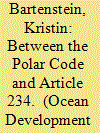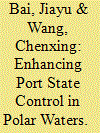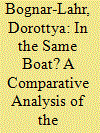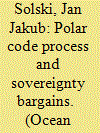|
|
|
Sort Order |
|
|
|
Items / Page
|
|
|
|
|
|
|
| Srl | Item |
| 1 |
ID:
136982


|
|
|
|
|
| Publication |
Oxon, Routledge, 2015.
|
| Description |
viii, 164p.Hbk
|
| Standard Number |
9781138855991
|
|
|
|
|
|
|
|
|
|
|
|
Copies: C:1/I:0,R:0,Q:0
Circulation
| Accession# | Call# | Current Location | Status | Policy | Location |
| 058161 | 320.09113/SIN 058161 | Main | On Shelf | General | |
|
|
|
|
| 2 |
ID:
169288


|
|
|
|
|
| Summary/Abstract |
In January 2017, the Polar Code entered into force and prompted the adoption, in Canada, of the Arctic Shipping Safety and Pollution Prevention Regulations (ASSPPR). The latter incorporate the Polar Code with a view to maintaining or increasing the preexisting level of protection. Consequently, a balancing act plays out in the ASSPPR, which are partly based on the Polar Code and partly on an alternative jurisdictional basis, arguably Article 234 of the United Nations Convention on the Law of the Sea. The objective of this article is to map out and put into historic perspective the balance chosen by Canada in the ASSPPR.
|
|
|
|
|
|
|
|
|
|
|
|
|
|
|
|
| 3 |
ID:
169286


|
|
|
|
|
| Summary/Abstract |
In recent years, the role of Port State Control (PSC) with respect to polar navigation has become increasingly important. However, international rules for PSC of fishing vessels plying polar waters are incomplete and uniform inspection guidelines have not yet been adopted, nor has a coordinated mechanism been created. This article argues that fishing vessels should be incorporated into the Polar Code and that at the practical level, states should promote the application of the Port State Control Officer Guidelines adopted under the Paris Memorandum of Understanding and encourage cooperation among the different PSC organizations that cover polar waters.
|
|
|
|
|
|
|
|
|
|
|
|
|
|
|
|
| 4 |
ID:
172433


|
|
|
|
|
| Summary/Abstract |
In the field of Arctic shipping, Canada and the Russian Federation have enacted extensive unilateral national regulations cognizant of Article 234, UN Convention on the Law of the Sea. On the global level, both states have been important actors in negotiating the International Maritime Organization’s mandatory Polar Code, a legal instrument with implications for regulations at the national level. This article compares and contrasts the approaches, positions, and arguments of Canada and Russia especially regarding national systems to control navigation and vessel-source pollution. The results suggest different emphases stemming from the two states’ political and economic realities and capacities.
|
|
|
|
|
|
|
|
|
|
|
|
|
|
|
|
| 5 |
ID:
190648


|
|
|
|
|
| Summary/Abstract |
Owing to a shift from the culture of compliance to the culture of benchmarking, the Polar Code process of ensuring safe operation and environmental protection in Polar waters is still ongoing. The risk and goal-based approaches embedded in significant parts of the Polar Code invite different stakeholders to participate in the development of Arctic shipping governance. The methodology used in the process, such as POLARIS, may serve as a common baseline, but its utility relies on further updates and validation. The reliability of decision-support systems depends largely on whether different stakeholders embrace the system and share their experiences to facilitate systematic updates. This article compares the approaches of the two major coastal states, Canada and Russia, to POLARIS as reflected in their coastal state systems of shipping control in the Canadian Arctic Waters and the Russian Northern Sea Route (NSR). Considering that much Arctic shipping occurs within the Canadian Arctic and the NSR, their regulatory approaches may affect POLARIS’s popularity, acceptance, and, eventually, success in providing a common regulatory baseline.
|
|
|
|
|
|
|
|
|
|
|
|
|
|
|
|
|
|
|
|
|